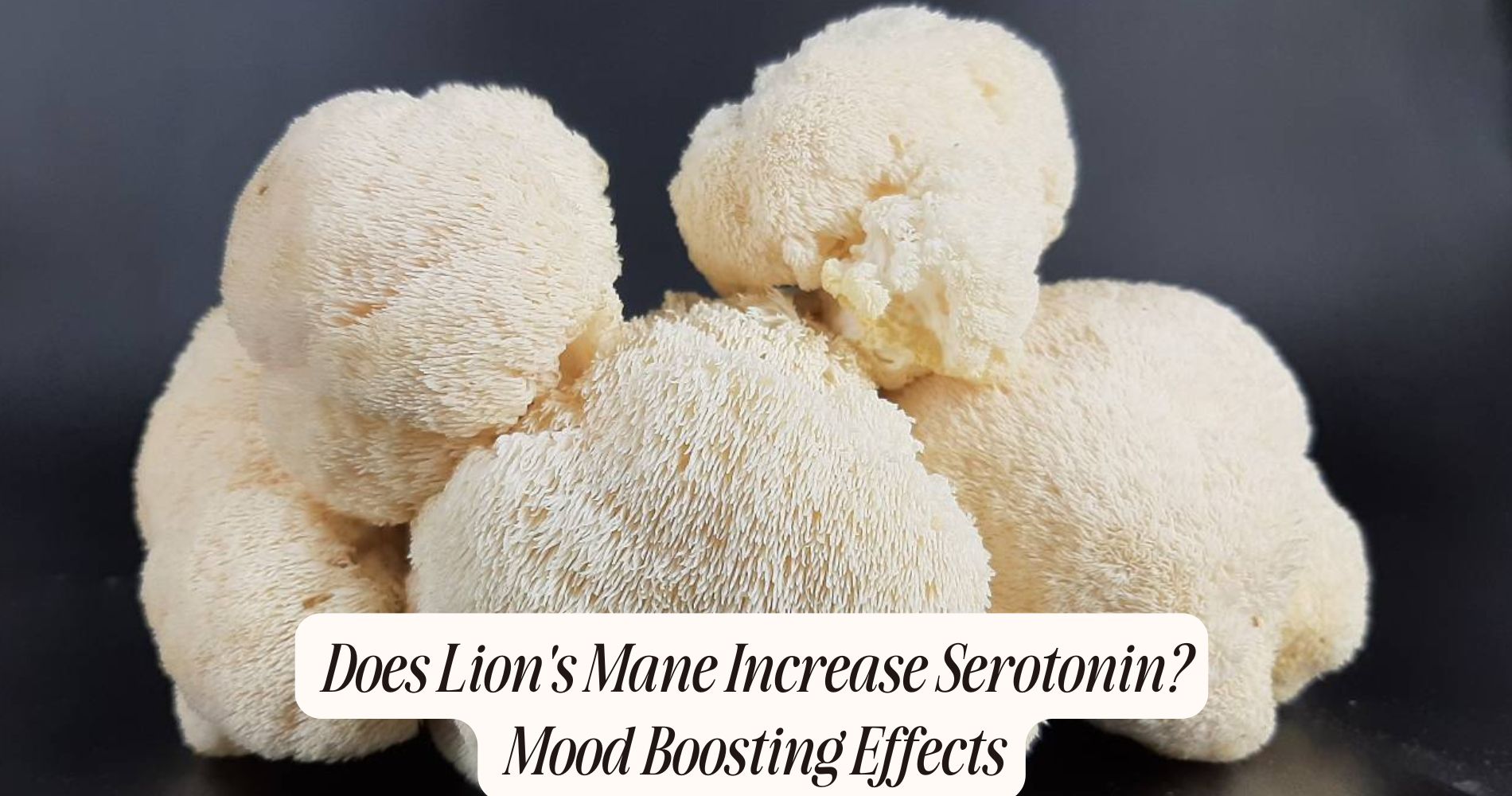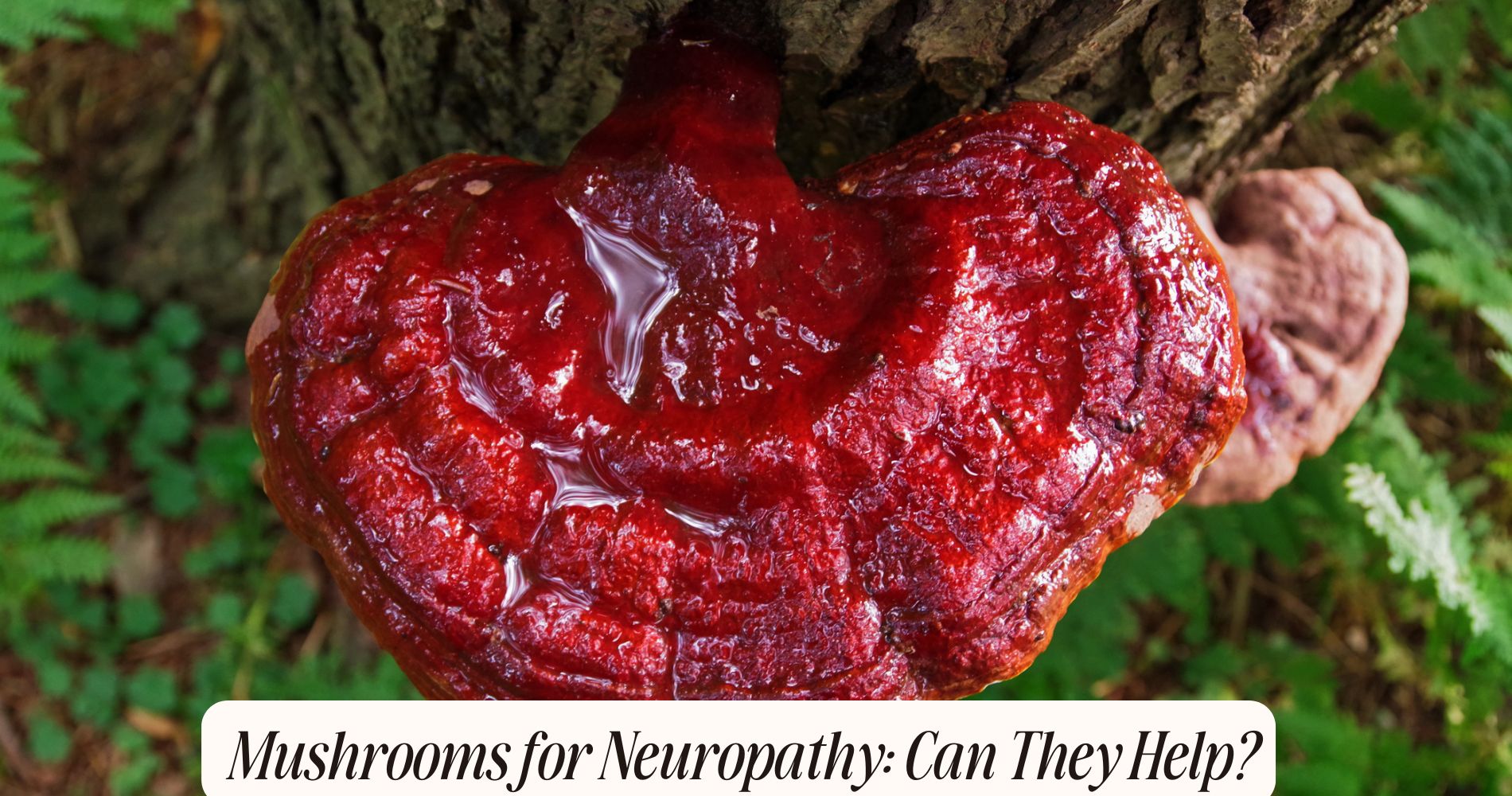
Does Lion's Mane Increase Serotonin? Mood Boosting Effects
Does lion's mane increase serotonin? Lion's Mane mushroom contains compounds like hericenones and erinacines that may boost mood by influencing serotonin levels and promoting neurogenesis. Studies show these compounds stimulate nerve growth factor (NGF) production, enhancing cognitive function and emotional stability. Modern research and clinical trials report significant reductions in depression and anxiety symptoms with Lion's Mane supplementation. Additionally, it may improve gut health, indirectly affecting serotonin through the gut-brain axis. While results are promising, further research with larger sample sizes is needed. For more intriguing insights into how Lion's Mane can impact your mood and cognitive health, continue exploring.
Understanding Serotonin
Serotonin is an essential neurotransmitter that regulates mood, appetite, and sleep, acting as a key player in maintaining mental health. You'll find that serotonin functions extend beyond just these areas, impacting systems such as learning, memory, and even cardiovascular health. It's synthesized from the amino acid tryptophan and is mainly found in the gastrointestinal tract, platelets, and the central nervous system.
When serotonin levels are ideal, you're likely to experience a balanced mood and a sense of well-being. However, irregularities can lead to serotonin disorders, which encompass conditions like depression, anxiety, and obsessive-compulsive disorder (OCD). For instance, low serotonin levels are often correlated with depressive symptoms, while excessive levels may contribute to serotonin syndrome, a potentially life-threatening condition characterized by excessive nerve cell activity.
Understanding serotonin's wide-ranging functions allows you to appreciate its complexity and importance. Research provides consistent evidence that both genetic and environmental factors can influence serotonin systems, leading to various mental health outcomes.
As a result, managing serotonin levels through diet, lifestyle, and possibly supplementation is critical for maintaining mental health and overall well-being. In this situation, understanding serotonin is foundational for exploring any potential treatments or supplements, like Lion's Mane, aimed at modulating serotonin activity.
Lion's Mane Overview
You'll find Lion's Mane mushrooms contain unique bioactive compounds like hericenones and erinacines, which have shown potential neuroprotective effects.
Historically, these mushrooms have been used in traditional medicine for cognitive and neurological health.
Cultivating Lion's Mane is relatively straightforward, making it widely available in both fresh and supplement forms.
Mushroom's Key Components
Lion's Mane mushroom contains several bioactive compounds, including hericenones and erinacines, which have been shown to influence neurogenesis and cognitive function. These mushroom compounds are primarily responsible for the mushroom's potential to enhance brain health.
Hericenones, found in the fruiting body, and erinacines, present in the mycelium, are the key bioactive ingredients that stimulate the production of nerve growth factor (NGF). NGF plays a critical role in the maintenance, survival, and regeneration of neurons.

Recent studies have demonstrated that these compounds can cross the blood-brain barrier, making them effective in promoting neuroplasticity. For instance, research published in the Journal of Medicinal Food indicates that erinacines notably increase NGF levels in the brain, which can lead to improved cognitive function and potentially mitigate neurodegenerative diseases like Alzheimer's.
Additionally, a study in the International Journal of Molecular Sciences notes that hericenones might have anti-inflammatory properties, further benefiting neurological health.
Historical Uses Overview
Throughout history, the Lion's Mane mushroom has been utilized in traditional medicine, particularly within Asian cultures, for its purported cognitive and health benefits. Ancient remedies, especially in Chinese and Japanese traditions, have leveraged Lion's Mane for its neuroprotective and digestive properties. You can trace its cultural significance back to texts like the 'Compendium of Materia Medica,' where it was recommended for enhancing memory and overall brain function.
Evidence from historical records suggests that Buddhist monks consumed Lion's Mane tea to enhance focus during meditation. Its use wasn't limited to spiritual practices; ancient remedies also included it for gastrointestinal health, showing its broad therapeutic application.
The mushroom's bioactive compounds, such as hericenones and erinacines, are believed to stimulate nerve growth factor (NGF) production, a critical protein for nerve cell maintenance and regeneration.
Modern research validates some of these traditional claims. Studies indicate that Lion's Mane may have neurotrophic effects, supporting its historical use for cognitive enhancement. While today's scientific methods provide more concrete evidence, the mushroom's long-standing cultural significance underscores its enduring relevance in natural medicine.
Therefore, understanding its historical uses offers a foundation for exploring its potential mood-boosting effects.
Cultivation and Availability
Cultivating Lion's Mane mushrooms involves specific environmental controls and substrate preparations to optimize growth and yield.
You need to maintain a controlled environment with temperatures ranging from 20-25°C and high humidity levels around 85-90%. These conditions mimic their natural habitat, ensuring robust growth.
When it comes to substrate, you can use hardwood sawdust or a mix of sawdust and bran. Sterilization of the substrate is essential to prevent contamination and promote healthy mycelial growth. After inoculating the substrate with Lion's Mane spawn, you'll incubate it in a dark, warm environment until mycelium fully colonizes the substrate.

Once colonization is complete, move the substrate to a fruiting chamber with increased light exposure and fresh air exchanges. This stimulates the formation of fruiting bodies, which are the mushrooms you harvest.
In terms of market availability, Lion's Mane has become increasingly popular due to its potential health benefits, leading to a surge in both commercial and small-scale cultivation.
You can find these mushrooms in specialty health food stores, farmers' markets, and even through online retailers. The rising demand has also made cultivation kits readily accessible for home growers.
Traditional Uses
Ancient medicinal practices have long recognized the therapeutic potential of Lion's Mane, particularly in enhancing cognitive function and mood stability.
For centuries, traditional remedies in East Asian cultures have leveraged this mushroom's properties for its reputed neuroprotective and antidepressant effects. Within these societies, Lion's Mane holds cultural significance, often associated with longevity and mental clarity. Traditional Chinese Medicine (TCM) and Japanese herbal medicine (Kampo) have used Lion's Mane to address various ailments, including digestive issues and general weakness, but its role in mental health is particularly remarkable.
You might find it interesting that these traditional uses are rooted in empirical observations. Healers noted that regular consumption of Lion's Mane led to improvements in memory and emotional well-being. This aligns with TCM principles which emphasize the balance of Qi, or life energy, for overall health. The mushroom's application in these ancient practices underscores its long-standing reputation as a natural nootropic and mood stabilizer.
These traditional uses form a foundation for modern scientific inquiry into Lion's Mane. While ancient healers lacked the tools of contemporary science, their observations have prompted detailed research into the mushroom's bioactive compounds and their effects on the brain.
Scientific Studies
Building on these traditional uses, modern scientific studies have begun to uncover the specific bioactive compounds in Lion's Mane that contribute to its mood-boosting and cognitive-enhancing effects. Researchers have identified hericenones and erinacines as key compounds that may play a role in serotonin synthesis. Serotonin is vital for regulating mood, and its increased synthesis can potentially alleviate symptoms of depression and anxiety.
Clinical trials have started to evaluate Lion's Mane's impact on mental health. One study involving 30 women showed that daily intake of Lion's Mane greatly reduced symptoms of depression and anxiety compared to a placebo. Another study with older adults demonstrated improved cognitive function and reduced mild cognitive impairment after regular consumption of Lion's Mane.
These clinical trials provide compelling evidence, but it's important to note the sample sizes are relatively small, and further research is necessary to confirm these findings. However, the preliminary results are promising and suggest that Lion's Mane could be a valuable natural supplement for enhancing mood and cognitive health.
Future studies will need to explore the precise mechanisms and broader applications to fully validate these benefits.
Mechanisms of Action
You can understand Lion's Mane's mood-boosting effects by examining its action on neurogenesis and synapse formation.
Evidence shows that compounds in Lion's Mane stimulate nerve growth factor (NGF), enhancing neural connectivity.
Additionally, research indicates it boosts serotonin production, a critical neurotransmitter for mood regulation.
Neurogenesis and Synapses
Lion's Mane mushroom, scientifically known as Hericium erinaceus, has been shown to promote neurogenesis and synaptic plasticity, potentially explaining its mood-boosting effects. Key compounds in Lion's Mane, such as hericenones and erinacines, are believed to stimulate the production of Nerve Growth Factor (NGF), a protein fundamental for the growth and survival of neurons. This neurotrophic activity underpins the cognitive enhancement and brain health benefits often attributed to the mushroom.
When you consume Lion's Mane, these compounds can cross the blood-brain barrier and directly influence brain function. By promoting neurogenesis, the mushroom helps generate new neurons, which is essential for maintaining cognitive function and emotional stability.

Additionally, synaptic plasticity—the ability of synapses to strengthen or weaken over time in response to activity levels—is enhanced, which is crucial for learning, memory, and overall brain resilience.
Studies have demonstrated that increased neurogenesis and synaptic plasticity can alleviate symptoms of depression and anxiety, thereby contributing to a more balanced mood. The mushroom's impact on these neuronal pathways offers a compelling explanation for its potential as a natural mood enhancer. This makes Lion's Mane a valuable ally in supporting both cognitive and emotional well-being.
Serotonin Production Boost
Enhancing serotonin production, Lion's Mane mushroom exerts its mood-boosting effects through multiple biochemical pathways.
First, it contains bioactive compounds like hericenones and erinacines that stimulate the synthesis of nerve growth factor (NGF) and brain-derived neurotrophic factor (BDNF). These neurotrophic factors support the health and function of serotonergic neurons, which are vital for serotonin synthesis and mood regulation.
Moreover, Lion's Mane has been shown to modulate the gut-brain axis. The mushroom's polysaccharides can improve gut health by fostering beneficial microbiota, which in turn produce metabolites that influence central nervous system functioning. This gut-brain interaction plays an important role in the regulation of serotonin levels and overall mood.
Additionally, Lion's Mane may reduce inflammation and oxidative stress, both of which can negatively impact serotonin production. By mitigating these stressors, the mushroom helps maintain a biochemical environment conducive to peak serotonin synthesis.
Experimental studies have also indicated that Lion's Mane enhances the availability of tryptophan, a precursor to serotonin. By increasing the levels of this essential amino acid, the mushroom guarantees that your brain has the raw materials needed for effective mood regulation.
Mood Benefits
Several studies indicate that Lion's Mane mushroom may greatly enhance mood by modulating neurotrophic factors and reducing inflammation.
For instance, research suggests that its bioactive compounds, hericenones and erinacines, stimulate the production of nerve growth factor (NGF). This neurotrophic influence may promote mood enhancement by supporting cognitive function and emotional well-being.
Lion's Mane also exhibits anti-inflammatory properties that could play an essential role in mood regulation. Chronic inflammation has been linked to depression and anxiety, and by mitigating this inflammation, Lion's Mane may contribute to a more balanced emotional state.
Moreover, a study published in the Journal of Ethnopharmacology highlighted that Lion's Mane supplementation led to significant reductions in symptoms of depression and anxiety among participants.
Additional research in animal models supports these findings, showing that Lion's Mane extract can alleviate stress-induced behaviors and improve overall mood.
User Experiences
Many users report significant improvements in mood and reductions in anxiety after incorporating Lion's Mane into their daily regimen. User testimonials frequently highlight enhanced mental clarity and a general sense of well-being. For example, some personal stories describe individuals experiencing less frequent bouts of depression and a noticeable uplift in their daily mood.
Analyzing these personal stories reveals a pattern: multiple users mention feeling more resilient to stress and better equipped to handle daily challenges. One common theme in user testimonials is the perceived reduction in anxiety levels, which many attribute to the neuroprotective properties of Lion's Mane.

On social media platforms and wellness forums, users often share their experiences, providing a wealth of anecdotal evidence. Some report that their sleep quality has improved, which they believe contributes to their overall mood enhancement.
While these accounts are subjective, the consistency and volume of positive feedback suggest a correlation between Lion's Mane supplementation and improved mood.
Potential Side Effects
Despite its potential benefits, you should be aware of the possible side effects associated with Lion's Mane supplementation. One notable concern is the risk of allergic reactions. Some individuals report symptoms such as skin rashes, itching, and respiratory issues after consuming Lion's Mane. These reactions can occur due to the mushroom's protein content, which may act as an allergen. If you have a history of mushroom allergies, it's important to approach Lion's Mane with caution.
Adhering to dosage recommendations is another significant aspect to take into account. Overconsumption can lead to gastrointestinal discomfort, including bloating, nausea, and diarrhea. The recommended daily dosage typically ranges from 500 to 3,000 milligrams, depending on the extract's concentration and your body's tolerance. Starting with a lower dose and gradually increasing it can help mitigate adverse effects.
Additionally, some users have reported experiencing dizziness and fatigue, though these side effects are relatively rare. It's crucial to monitor your body's response when you incorporate Lion's Mane into your regimen.
Consulting a healthcare professional before beginning supplementation can provide personalized advice and help guarantee safe use. Your well-being should always take precedence when exploring new dietary supplements.
Elevate Your Mood with SUPER MUSHROOM GUMMIES
As you explore whether Lion's Mane increases serotonin and its potential mood-boosting effects, consider enhancing your wellness routine with Well Gummies' SUPER MUSHROOM GUMMIES. This convenient gum chew product is packed with 10 types of functional mushrooms, including Lion's Mane, to naturally fuel your brain and energize your body. Our vegan gummies provide calmer energy, sharper focus, and immune support for a balanced body and clear mind.
Enjoy the delightful taste of fresh wild berries, just as delicious as your favorite candy, but without the jitters or crash. Shine all day with the natural benefits of SUPER MUSHROOM GUMMIES and support your overall health effortlessly.
Frequently Asked Questions
Can Lion's Mane Be Taken With Other Supplements?
Yes, you can take Lion's Mane with other supplements. Research supports Lion's Mane synergy with various supplement combinations, enhancing cognitive function and overall wellness. However, consult your healthcare provider for personalized advice and potential interactions.
How Long Does It Take to Feel Effects of Lion's Mane?
The Lion's Mane effects timeline varies widely due to individual response variability. Some people report noticeable benefits within a few days, while others may need several weeks. Consistent use and personal factors greatly influence how quickly you'll feel effects.
Is Lion's Mane Safe for Pregnant or Breastfeeding Women?
When considering Lion's Mane for pregnant or breastfeeding women, you should consult safety guidelines. Limited research increases breastfeeding risks, so err on the side of caution and seek advice from a healthcare professional before use.
What Is the Recommended Daily Dosage of Lion's Mane for Mood Enhancement?
For ideal dosage in mood regulation, research suggests taking 500-3,000 mg of Lion's Mane daily. Start with a lower dose and gradually increase to assess tolerance and effectiveness. Always consult your healthcare provider before starting.
Can Lion's Mane Cause Interactions With Prescription Medications?
Yes, Lion's Mane can cause medication interactions. Studies suggest that it may affect blood clotting and interact with anticoagulants. Always consult your healthcare provider before combining Lion's Mane with any prescription medications for safety.
Conclusion
In conclusion, while lion's mane shows potential for boosting serotonin and enhancing mood, the evidence is still emerging.
Traditional uses and preliminary scientific studies suggest positive effects, but more rigorous research is necessary to confirm these benefits.
The mechanisms seem promising, involving neurogenesis and anti-inflammatory properties.
User experiences are generally positive, yet individual responses vary.
Always consider potential side effects and consult a healthcare professional before starting any new supplement regimen.




